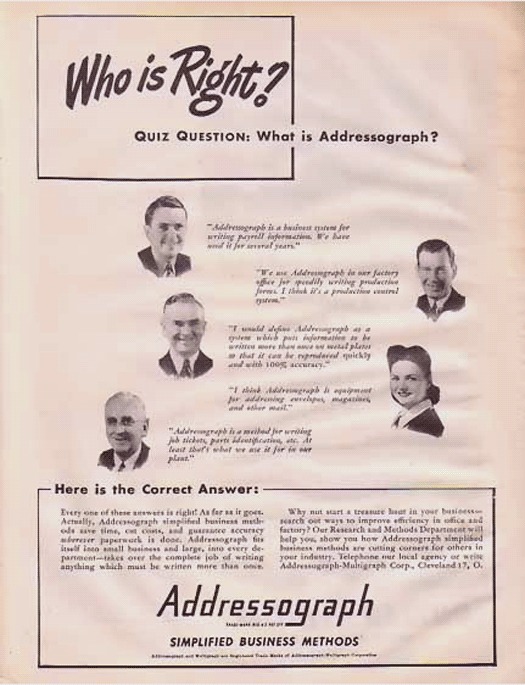
Vintage ad for the Addressograph, about 1945
I got my very first job was when I was 13 years old (and only eligible for temporary working papers) in the advertising department of Bergdorf Goodman in New York. You’d think I was a prodigy, but that’s not true. A friend of the family — a buyer for Bergdorf’s — got me hired on Saturdays to work the Addressograph. Among other things, this was the machine used to create “charge plates.” Before plastic credit, consumers carried card-sized metal, not unlike dogtags, from which an impression of one's’ name and address were printed on invoices.
I was hired to input the names, which were embossed on the plates. I lasted two days, before the boss-lady realized I reversed many of the letters. What’s more, I had not yet learned the fine craft of touch typing, so I slowly produced one plate every five minutes or so. (The norm was one every 20 seconds). I was asked to resign, and was then offered a stock boy job instead, but after this white-collar assignment, I wasn’t about to go blue.
Thanks to my Mother (who worked as a buyer for major department stores) I was offered another job in the advertising agency for Russ Togs. The owner of the agency asked if I could do “comps,” whatever that was. I said yes, and was put to work comping an ad concept (Russ Togs had great advertising with the slogan Russsssssssssss). Sounds good, right? Wrong! I was 13 years old, and didn’t know how to sketch anything other than a poorly rendered superhero. Imagine the shock on the office manager’s face when after a few hours laboring at my drawing board she saw the mess that I was making of Russ Togs. They didn’t have to fire me: I simply didn’t show up the next day.
Assuming that advertising wasn’t my calling — but the fashion business was — my mom wrangled me a job at Melody Knitwear in the front office as an adding machine operator. My job was to enter the number of units sold onto invoices. The company was doing well before my arrival. Needless to report, my number skills were on a par with my comping abilities. This time I was told I had a choice: firing or stock boy-ing. I chose the latter (I had just turned 14 and realized pride could come later). My task was to read on the manifest how many lots of sweaters were to be boxed, stuff the boxes with garments, tape and address them. That job I did pretty well.
Three years later I became an art director. Go figure.
